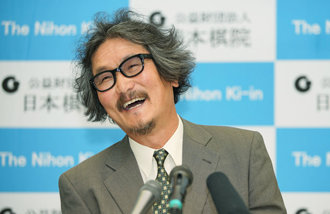Who will be Japan`s next prime minister?
Who will be Japan`s next prime minister?
Posted August. 31, 2012 06:48,
Who will become Japan`s next prime minister is drawing speculation in the wake of the House of Councilors adopting a censure motion against the incumbent Yoshihiko Noda in a plenary meeting Wednesday.
Noda told a news conference Thursday that he would do his best to resolve pending issues, suggesting he will reject a proposal to hold general elections early. Yet even insiders of the ruling Democratic Party of Japan say the dissolution of the House of Representatives in fall is a done deal. On Tuesday, Noda ordered his party to speed up preparations for elections in a meeting at the partys election headquarters.
The main opposition Liberal Democratic Party will likely win in the elections given its lead in opinion polls. Under the parliamentary cabinet system, the head of the ruling party becomes prime minister, so the liberal party`s leadership election scheduled for around Sept. 26 will likely determine the countrys next leader.
Many observers expect party chairman Sadakazu Tanigaki, who has led the main opposition party smoothly, to be reelected. He does have rivals, however.
Shigeru Ishiba, former chairman of the partys Policy Research Council, is emerging as a dark horse given his wide support from party members across the country. To his advantage, party members have 300 votes, outnumbering the 200 votes of lawmakers.
In addition, he is considered the right man to cope with Japans diplomatic friction with China and Korea thanks to his expertise in national security and experience as a former defense minister.
Nobutaka Machimura, former chief cabinet secretary and leader of the liberal partys biggest faction with 50 lawmakers, and former Prime Minister Shinzo Abe are also preparing to run for chairman.
The Machimura faction once produced four consecutive prime ministers from Yoshiro Mori and once had 90 lawmakers as members, but is on the verge of collapse over the upcoming elections.
Abe, who has attracted Japans right-wing groups due to his series of provocative comments about past history, is actively seeking an alliance with Osaka Mayor Toru Hashimoto. Abe, however, is under fire from other party members for having caused the party`s loss of a parliamentary majority in September 2007, when he suddenly resigned as prime minister after just a year in office due to illness.
In the ruling Democratic Party of Japan, which is scheduled to elect its chairman Sept. 21, Noda is expected to be reelected since anti-Noda politicians recently bolted from the party en masse. A rival faction led by former Prime Minister Yukio Hatoyama, however, is actively moving to challenge Noda.
Noda`s rivals include Makiko Tanaka, daughter of former Prime Minister Kakuei Tanaka, and Sumio Mabuchi, former minister of land, infrastructure, transport and tourism who competed against Noda in the partys previous election for chairman.
bae2150@donga.com







